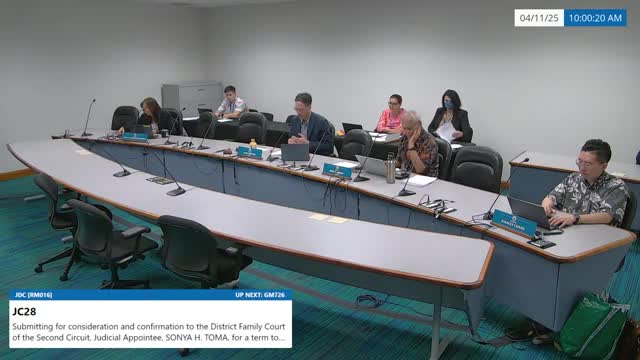Testimony splits on Sonia Toma’s nomination to Maui family court; opponents cite conflict of interest
Get AI-powered insights, summaries, and transcripts
Subscribe
Summary
The Senate Judiciary Committee took testimony both for and against Sonia Toma’s nomination to the District Family Court of the Second Circuit, with opponents citing her prior role representing Child Protective Services as a conflict of interest.
The Senate Committee on Judiciary heard contested testimony on the nomination of Sonia Toma to the District Family Court of the Second Circuit (Maui County). Opponents told the committee her prior work as a deputy attorney general representing child welfare services raises a conflict of interest for a family court judgeship; supporters, including the Hawaii State Bar Association, said she is qualified and experienced.
Melody Rollnick (testifying in strong opposition) told senators that Toma’s prior role representing Child Protective Services means she would be presiding over the same agency she once advocated for. "That presents a clear conflict of interest and undermines the appearance of judicial neutrality," Rollnick said.
Michelle Lehi, speaking on Zoom, gave detailed testimony about her personal experience with child welfare proceedings and said Toma signed court orders during the case. Lehi described the case as traumatic and blamed the attorney general’s office for decisions she said harmed her son. The committee cut short her allotted time, but the account occupied a substantial portion of public testimony.
HSBA President Mark Murakami told the committee the Hawaii State Bar Association conducted its screening and authorized a statement that it found Toma qualified. Murakami again described the HSBA process as involving a small appointed committee that interviews references and brings nominees before the full board; he told senators the board reviews confidential comments and does not publish a simple numeric tally of member responses.
Toma, the nominee, described her background in both private family law practice and in public service. She said she worked at the Department of the Attorney General from April 2021 through January 2023, representing Child Welfare Services and other state agencies, and later joined the county as corporation counsel and then the prosecutor’s office. She said she could not comment on the facts of confidential cases but disputed aspects of Lehi’s account and stressed she would be a fair and impartial judge if confirmed.
Toma also explained parts of the family‑court process during questioning: she said a child welfare agency must file a petition after a removal and that the agency "has to file a petition within 48 hours" after taking custody; she described the department's investigative role, the temporary foster custody hearing, and that the court appoints counsel for parents at initial hearings.
Committee leadership again said no confirmation vote would be taken on the judicial nominees at this hearing; the committee scheduled the vote for the rescheduled session on April 15 in Room 225. No formal action on JC 28 took place during this meeting.
Why it matters: Family court judges decide the custody and welfare of children and preside over cases involving Child Protective Services. Opponents argued that a recent role representing CPS would create at least the appearance of partiality; supporters said practical experience with family‑law practice and public agencies can prepare a judge to manage complex family cases.
What’s next: The committee will consider JC 28 at the rescheduled session on April 15, when members may take a recorded vote.
